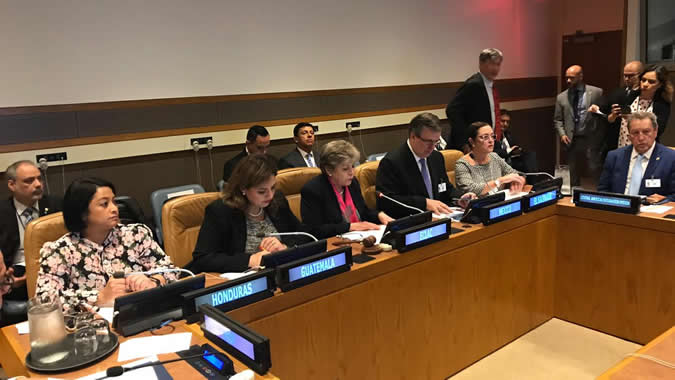El Salvador, Guatemala, Honduras and Mexico Reaffirm their Commitment to the Comprehensive Development Plan
Work area(s)
Representatives of the four governments convened a high-level meeting today at United Nations headquarters in New York to discuss the Plan and challenges to its implementation

Foreign Ministers and other senior authorities from the governments of El Salvador, Guatemala, Honduras and Mexico reaffirmed their commitment to the Comprehensive Development Plan in order to find comprehensive solutions to migration and sustainable development and to deepen regional cooperation, during a high-level event held today in New York, in the framework of the 74th session of the United Nations General Assembly.
Participating in this event were the Foreign Minister of El Salvador, Alexandra Hill; the Foreign Affairs Minister of Guatemala, Sandra Jovel Polanco; the Foreign Affairs Secretary of Mexico, Marcelo Ebrard; the Alternate Permanent Representative of Honduras, Irma Rosas; the Executive Secretary of the Economic Commission for Latin America and the Caribbean (ECLAC), Alicia Bárcena; and, as a guest, the Secretary General of the Central American Integration System (SICA), Vinicio Cerezo.
At the event, authorities discussed the scope of the Comprehensive Development Plan, which all four countries have adhered to, and they reiterated their commitment to continue working in order to establish their development priorities and to produce a portfolio of initiatives and projects with the support of ECLAC and the United Nations System.
They also stressed the complementarity between the objectives of the Comprehensive Development Plan and the needs of the four governments with regard to fulfilling the 2030 Agenda and its 17 Sustainable Development Goals.
This initiative is the result of the mandate given to ECLAC on December 1, 2018 by the Presidents of El Salvador, Guatemala, Honduras and Mexico, to carry out an assessment and make recommendations as well as identify areas of opportunity and draft a Plan that would address the structural causes of migration, allowing human mobility to become a safe option. Thus far, this initiative is the most comprehensive effort worldwide aimed at implementing the Marrakech Compact, and it complements other projects led by the Central American Integration System.
The Comprehensive Development Plan targets the structural causes of migration; insufficient and exclusionary economic growth; low levels of per capita social spending and protection; challenging demographics, with the massive incorporation of young people into the labor market; explosive urbanization and persistent lagging in rural areas; high vulnerability to drought and flooding linked to climate change; chronic violence that tears at the social fabric; as well as the legitimate desire for family reunification and the enduring gap in wages and productivity with the United States, a country that has become the destination for the majority of migrants.
The objective of the Comprehensive Development Plan is to create a space for sustainable development and local opportunities, in an articulated way, between El Salvador, Guatemala, Honduras and Mexico, to improve the population’s quality of life, with a comprehensive vision that addresses the migratory cycle and enables migration to be an option rather than an obligation. To that end, the Plan contemplates diverse proposals organized around four strategic pillars: a) economic development; b) social well-being; c) environmental sustainability and adaptation to climate change; and d) comprehensive management of the migratory cycle.
As part of ECLAC’s technical support of countries – in the framework of the Plan – it has provided important recommendations that nourish these strategic pillars, among which the following stand out: the adoption of macroeconomics for development (progressive taxation, increased social spending, investment promotion, stronger tax administration); productive and territorial development focused on narrowing gaps; trade, energy, logistical and digital integration and the decarbonization of the economy; mitigation and adaptation to climate change; and the management of the migratory cycle in all its phases using a human security approach. All the United Nations agencies, funds and programs that work in Latin America enriched this process of preparing recommendations by contributing their experience.
Related content

El derecho al desarrollo en el lugar de origen es la solución para que la migración sea una opción y no una obligación: CEPAL
In a ceremony led by President Andrés Manuel López Obrador, the Executive Secretary of the UN regional commission, Alicia Bárcena, presented to Mexico a proposal for the El Salvador-Guatemala…
Subregional headquarter(s) and office(s)
Country(ies)
- Latin America and the Caribbean
Contact
Public Information Unit
- prensa@cepal.org
- (56 2) 2210 2040